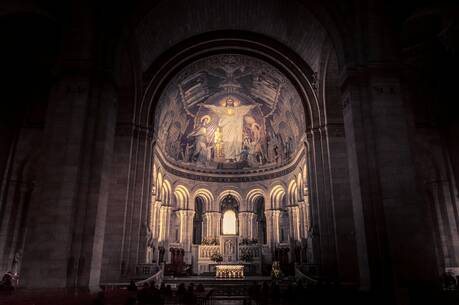Little Children of the Word
In his teaching on divorce, Jesus claims that the circumstances that allowed for divorce in the Mosaic law were due to the “hardness of heart” of human beings after the fall. These laws were conditional, Jesus says, not God’s intent “from the beginning of creation.” Jesus cites passages from Genesis that reflect the human condition prior to the fall from Paradise. In the Garden, “God made them male and female,” reflecting Gn 1:27, with the intent that “a man leaves his father and his mother and clings to his wife, and they become one flesh” (Gn 2:24).
In his teaching on marriage, therefore, Jesus is directing us to the beginning, what is called in German theology the Urzeit, the time prior to human sin. What are the grounds for Jesus’ statement that his followers are once again in the time of the beginning? What are the signs that it is Paradise now? Jesus himself, the Word made flesh, “who for a little while was made lower than the angels,” is the sign.
The German biblical scholar Lutz Doering writes that in Jesus’ teaching “what we encounter…is a model of restoration of paradisiacal conditions in the kingdom of God, an Urzeit-Endzeit correlation” (158). For with Jesus comes the inauguration of the kingdom of God, the beginning of the eschaton, or Endzeit, when God will make all things new. It is only with the coming of the Messiah that we can hope to be transformed into people of the kingdom, capable of following God’s intent “from the beginning of creation.”
It is true, of course, that we do not live in the Garden of Eden now. Every sin of our own wayward hearts, every sign of sin and destruction in the world makes that obvious to us all. And yet Jesus tells us that the conditions have changed. The Endzeit has been inaugurated with the coming of the kingdom, because the Messiah came to live among us and to allow us to follow his way, established by Jesus to bring “many children to glory…for the one who sanctifies and those who are sanctified all have one Father. For this reason Jesus is not ashamed to call them brothers and sisters.” Jesus, our brother, has come to bring us to our true, native home, but also to show us how we must live there.
The pathway home was not obvious to Jesus’ first disciples, who asked Jesus “again about this matter” of marriage and divorce. Jesus instructed them further regarding these things, but one might argue he instructs them more significantly by indicating the change of heart necessary to enter the kingdom and to live according to the ways of the kingdom. The kingdom is about transformation, about conversion of intellect, heart and soul.
At the end of the discourse about marriage and divorce, the disciples want to send away people who were bringing children to Jesus, “and the disciples spoke sternly to them.” This, however, is not the way of the kingdom but of the fallen world. Jesus “was indignant” with the disciples, saying “Let the little children come to me; do not stop them; for it is to such as these that the kingdom of God belongs. Truly I tell you, whoever does not receive the kingdom of God as a little child will never enter it.”
What it means to “receive the kingdom of God as a little child” is surely complex. Or is it? Is Jesus’ point that as little children accept Jesus, and the ways of God, with vulnerability, openness, freedom, innocence, guilelessness, not to gain anything, not to calculate wins and losses, but simply to accept the kingdom for what it is, so we must accept the kingdom? If we are being taken back to the Urzeit, to Paradise restored in the Endzeit, then we are being taken to a time of primal innocence, in which the love of the other, in marriage as well as all of our other relationships, is grounded in God’s perfection. Surely none of us is perfect now; but the kingdom calls for transformation, to become like a “little child,” and the one who calls us will surely bring us home.
This article also appeared in print, under the headline “Little Children of the Word,” in the September 28, 2015, issue.








